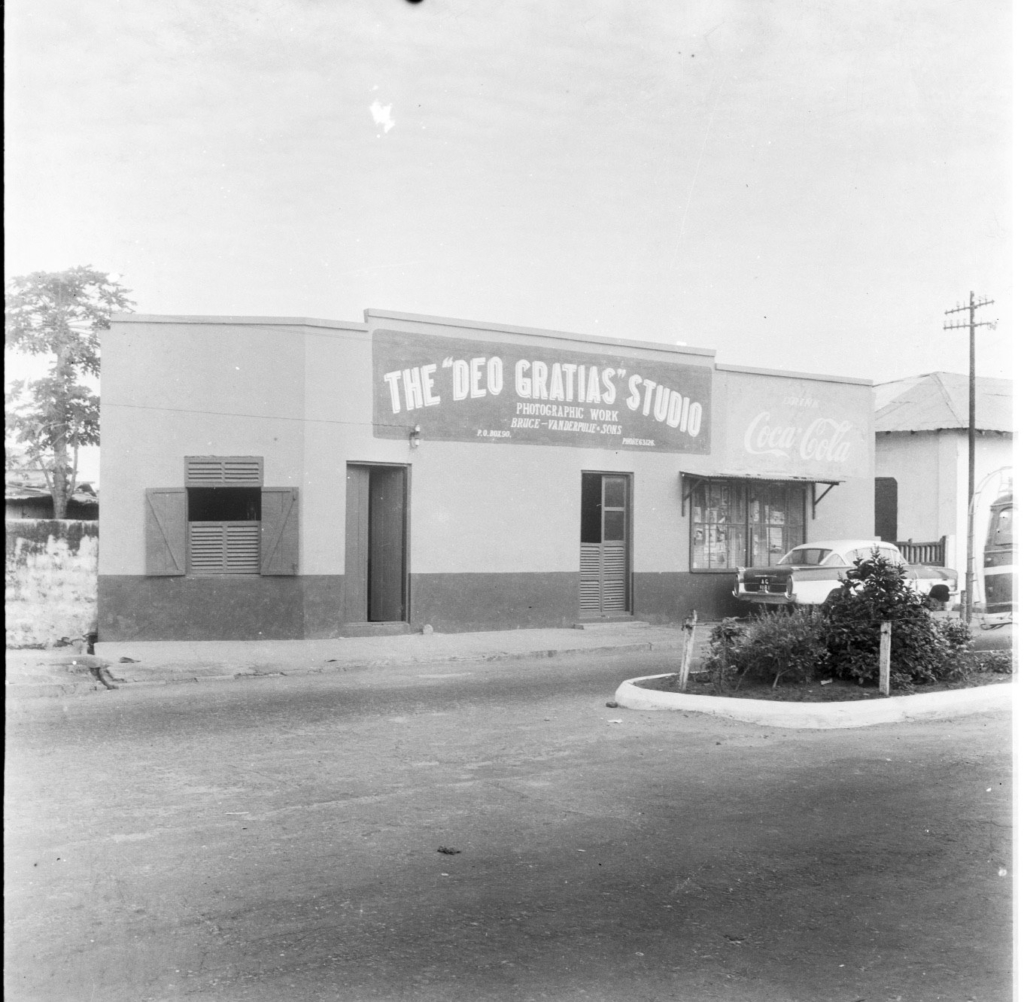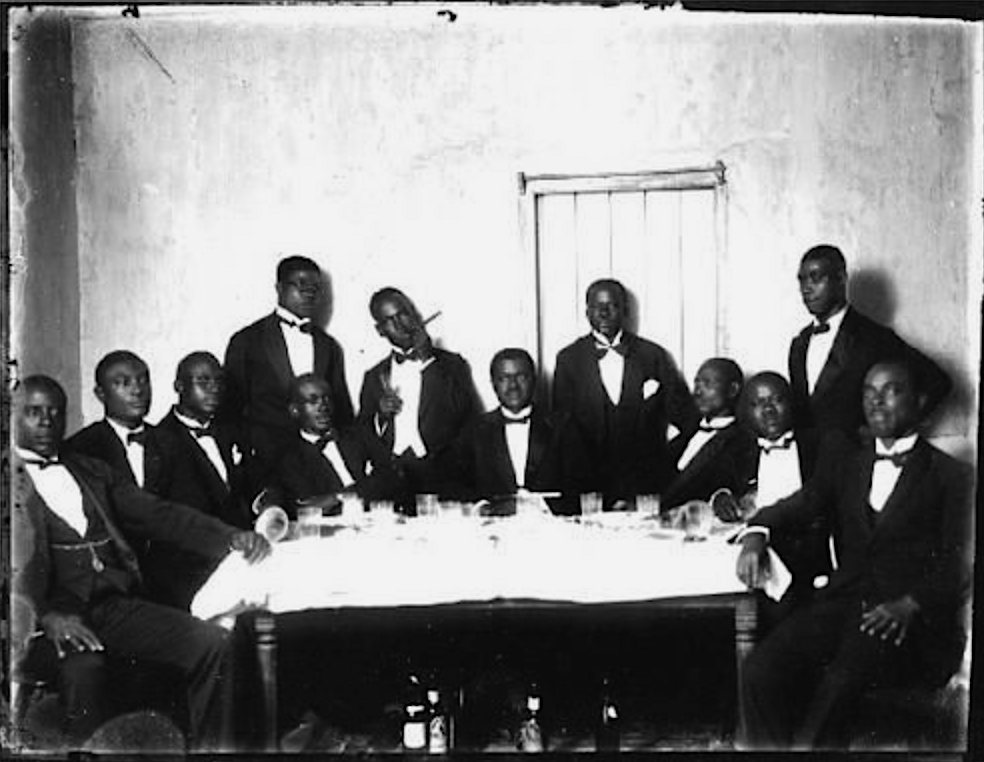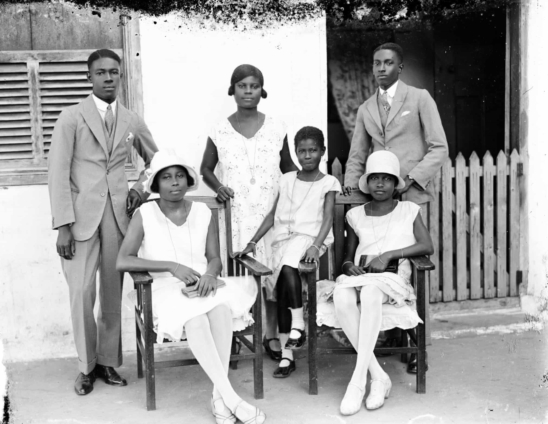The pen is mightier than the sword but, sometimes, I dare say, the camera exceeds the prowess of the pen. Preeminent among all avant-gardists, the iconic cultural custodian, James Kobla Bruce Vanderpuije, at the youthful age of 23, set a revolution in motion-picture when, in 1922, he founded the Deo Gratias photography studio at Jamestown, British-Accra, Gold Coast.
J. K. Bruce Vanderpuije has an unmatched portfolio of the most historic events in the Gold Coast. He captured the milestones of several opulent personalities, from the coxcomb gentlemen and debutantes of the era, to aristocrats, statesmen and socialites. But most importantly, J. K. Bruce Vanderpuije documented the latter aspect of an era which portrayed a self-conscious unit, within the Gold Coast, that set standards and wielded influence over the fate of society.
There were three main classes of elites in the Gold Coast, namely the traditional aristocratic families; European rulers; and educated Africans.
The extent of social influence elites had was based on close personal relations between themselves and a collective effort to disseminate acquired values to less privileged people.
The stronger such bonds, the greater the power of the beau monde to make new ideas acceptable to society at large, or hinder unfavourable trends. Elitism was not just about privilege, such as the wealth of the aristocrats or merchants, but was extended to include intellectual interests, etiquette and fashion. These were factors that distinguished the upper class and made them imitable.

The culture of fashion and social status.
European fashion was particularly important as an outward and visible sign of affluence. The cult of English fashion in the Gold Coast began in the 1820’s when, by the request of Christian locals, Rev. T. B. Freeman visited London and brought a considerable amount of English styled clothes and furniture.
Men who could afford expensive garments encouraged their wives to dress in Victorian style, especially on Sundays. The ‘Kabasrotu’, a sort of loose jumper for the upper part of the body, had been introduced by R. J. Ghartey of Winneba, in 1860, for use among the women of his household. This indirectly influenced women’s fashion in other sections of the community.
In 1868, Dr Africanus Horton remarked that although majority of Fantes dressed traditionally, European fashion was associated with the educated class and intelligentsia. Clerks employed by the Colonial Office were required to attend work uniformed in European clothes.

There were conservatives who frowned upon British fashion and the gradual infiltration of European ideas and standards of decency. “No woman should be allowed to go through a single street in the country with her breast uncovered!”, wrote an angry young man in 1897.
Already, fashion was an important means by which ‘ladies’ anxiously sought to distinguish themselves from perceived unenlightened peers. As a Wesleyan missionary once remarked, “The lady wears a European dress, the woman only wears a cloth”.
The Ladies Mutual Club, founded in Sekondi, 1904, wrote essays on topics such as ‘The term Lady’, and, as a bye-law of the club, fined members who went out in traditional wear. After a year, however, they relented sufficiently on the question of language and permitted members to speak Fante “at the meetings of the Club once a month, in order to feel at home”.
Social evolution of elitism.
During the latter half of the nineteenth century many aristocrats anxiously solicited the guidance of educated advisers to help them with foreign governments beyond the boundaries of their State.
When Africans in the Gold Coast received western education and became qualified for employment in the colonial economy, they faced many varied instances of discrimination.
A barrier was imposed by the amplified racial exclusiveness of the European elite, especially in the higher ranks of the civil service. The intelligentsia felt antagonised and frustrated. This aroused a strong motivation for nationalist agitation that was channelled into a demand for political power, partly as a means to control the sources of status and influence.
The individual accumulation of capital, which had been virtually unknown under the traditional system, became possible. But an increase in the scale of expatriate enterprise undermined the efforts of indigenous entrepreneurs.
The traditional aristocratic and educated elites felt the need for institutionalised integration with those who shared common interests and perspectives. They attached a great deal of importance to the establishment of diverse exclusive clubs and societies to foster social networks. Many of such groups were inspired by philosophies of self-advancement and mutual improvement.
The participation in modernist social clubs and nationalist politics was effectively limited to those with some command of English. English made it much easier for people across different States to communicate.
Typically, one's conversion from a traditionalist to a Christian, proficiency in the English language, imitation of European behaviour, and post-school employment in an urban milieu was a necessary requirement to ascend the social ladder.
Societies and Clubs.
In 1859, J. P. Brown, with four of his young friends started a private literary club in Cape Coast, named the Try Company, which remained active for three years. The Try Company founded a Reading Room in 1860.
The Anomabu Temperance Society was founded in 1862 by R. J. Ghartey after he visited England with F. C. Grant. The members, after a year’s activity, were able to report, with pride, the establishment of a Temperance hotel and a Temperance goldsmiths shop, each with light outside. These were ‘the first lamp posts ever erected in the streets of any town in the Gold Coast’.
The Philanthropic Society of Cape Coast was formed in 1864 with the very laudable and desirable object to raise public funds, albeit met with less success. They blamed this on the Colonial Office and white men who were said to have called their members half-educated and semi-civilised.
In 1874 the Rifle Club also met frequently in Cape Coast.
At a tea party in Saltpond, in 1886, a debate club was proposed, on the ground that ‘The Government neglect us intellectually, so we must educate ourselves’. The Cape Coast debate club was duly established. They organised the first debate in Winneba, from 7th to 13th December, 1886, about whether ‘celibacy was advantageous to mankind from an intellectual and religious point of view’. The society only appealed to a sophisticated circle.
In 1895, for example, a small-sized study group of youths in Cape Coast formed the Star of Peace Society. This later became the Three Wise Men Society with three branches at Anomabu, Saltpond, and Mankessim.
Cape Coast boasted of a City Club for social, physical and intellectual advancement. In 1897, the young J. E. K. Aggrey served as its secretary.
The Young Men’s Free and Mutual Improvement Society was established, in 1873, out of a desire of members to gain additional knowledge.
These new organisations eventually began to develop a political slant. The Gold Coast Union Association, launched at Cape Coast in October 1881, with J. F. Amissah as President, was an early straw in the wind.

By the 1920’s, a group of businessmen and traders emerged to form a large middle class. The middle class consisted of relatively small-scale entrepreneurs, traders, and the less exalted ranks of the educated salariat. By the 1920’s it was noticeably the wealthier professional minority who took the lead in the National Congress movement.
Photo: J. K. Bruce Vanderpuije
The author, Vincent Djokoto, is a Business Executive and Columnist.
Twitter/Instagram – @VLKDjokoto
Latest Stories
-
U20 AFCON: Ofei labels CAR clash a ‘mini final’ as Black Satellites target quarterfinal spot
6 minutes -
U20 AFCON: Black Satellites eye quarterfinal spot ahead of clash with CAR
15 minutes -
What is Vectorization in Fintech?
28 minutes -
Full text: Mahama’s address on marking 120 days in office
45 minutes -
‘Forest mining ends now’ – Mahama moves to permanently ban all mining in reserves
58 minutes -
Investigation underway into recent Armed Forces recruitment processes – Mahama
60 minutes -
24-Hour Economy Policy showing strong progress in first 120 days – Mahama
1 hour -
JoyNews scores Mahama 52% in his 120-day social contract
1 hour -
Mahama touts leanest gov’t in Fourth Republic with just 56 appointees
1 hour -
GBA finds its voice when NDC is in power – Justice Atuguba
2 hours -
Rev. Charles Opoku calls for arrest and prosecution of pedestrians who shun footbridges
2 hours -
GNFS records over 30% drop in prank calls in first quarter of 2025
2 hours -
Assin Ochiso: One dead, 4 hospitalised after river crossing in search of avocado
2 hours -
We received over 131,000 prank calls in first quarter of 2025 – GNFS
2 hours -
Twifo Praso: 2 men who reportedly murdered seamstress after a ‘for girls’ juju failed remanded
2 hours

